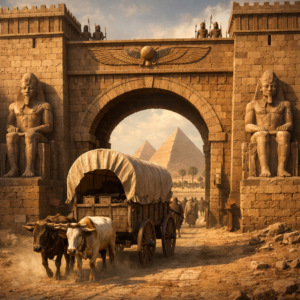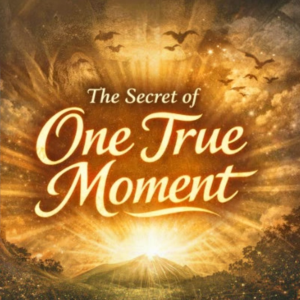- Faith ⬦ Read ⬦ Shabbat ⬦ Weekly Torah Portion
Curiosity Can Be Extremely Dangerous – Parshat Bereishit
Only one thing could cause a person to destroy himself—and that is curiosity. What exactly is so special about this tree that I am not being allowed access to?
By the grace of G-d, we merited reading the final portion of the Torah on Simchat Torah and celebrated our completing the Torah. With respect to this column, it is a double joy for having merited to accompany each parshat hashavua for an entire year with Torah lessons which explored the depth of the wisdom of our holy Torah. Now we are starting our second cycle from the beginning of Genesis with renewed excitement as we rediscover the wisdom of the Torah as if we had never done so before, because the wisdom of the Torah is truly infinite.
This week’s Torah portion is parshat “Bereishit.” The Torah describes the creation of the world as well as the creation of Adam and Eve who were the pinnacle of creation. Immediately afterwards the story of the temptation is related, in which the serpent enticed Eve to eat from the Tree of Knowledge. After G-d created man and placed him in the Garden of Eden, He warned him: “From all the trees of the garden, you may eat. But from the Tree of Knowledge of Good and Evil, you may not eat—for on the day you eat from it, you will surely die” (Genesis 2:16-17).
The serpent came to Eve because he knew that women could be enticed more quickly and because they knew how to entice their husbands (Rashi on Genesis 3:15), and in a round-about way, he tempted her by persuading her that she would become more enlightened and wiser if she ate from the forbidden tree: “For G-d knows that on the day you eat from it, your eyes will be opened. You will be like G-d, knowing good and evil” (Genesis 3:5). With his slick tongue, he tempted her: “You have no idea what you are missing out on. There is something about that tree over there which is very special and mysterious! If you just eat from it, you will be transformed into someone who knows good and evil. You will be more intelligent, wiser, and on a completely different level…” and so on and so forth. The campaign of persuasion was successful, the woman was enticed, and she also enticed her husband: “And she also gave to her husband, and he ate” (Ibid, 3:6). The bitter end of the saga is well known. From all of the promises that the serpent made, nothing remains—only destruction, sadness, curses, difficulty, and death. The man was cursed: “By the sweat of your brow you will eat bread,” and “there will sprout for you thorns and thistles.” And the woman was cursed: “You will give birth in pain” and other “gifts” of this kind.
What ever became of all these promises? Where are all those fantastic attainments and promises of success?
The serpent gave them false hopes and promises, and they believed him. What ever became of all these promises? Where are all those fantastic attainments and promises of success? Instead, Adam and Eve were eternally banished from the Garden of Eden and were destined to return to the earth. True, the snake was also cursed, but what did that help them?! If only they could go back and repair the enormous damage they had done, damage which would negatively affect all future generations. But by then it was too late. “Their eyes were opened, and they realized that they were naked.” “They had been given only one mitzvah and then they were stripped of it” (Rashi on Genesis 3:7).
And what about us? We think that we are pretty much OK. Isn’t this how we consider ourselves? We even allow ourselves to look at Adam and Eve with a critical eye, wondering how they could have made such a crucial mistake. In the depths of our hearts, we really want to shout: “How could you have let yourself be fooled?! Eve, why did you do that? Couldn’t you see that the false promises of the serpent had no basis? Adam, why did you let yourself be convinced by your wife? Couldn’t you have stopped her? Couldn’t you see how the snake was fooling you? How come you didn’t realize that from all these promises you would receive nothing, as people say, “You will get nothing, because there is nothing!”
So now it’s our turn to blush from embarrassment. It only seems to us that we stood on the sidelines and were not complicit in this tragic mistake. The Holy Arizal reveals that all of us, all the souls of all future generations, were included in the souls of Adam and Eve, and together with them the entire creation sinned. We were all there, and we were all enticed. And thus, we are actually all in the same boat. How embarrassing!
So too do we deceive ourselves in our daily lives that for the sake of success, we are allowed to deviate a little from the morals and values we have set for ourselves. If we just do such and such, we will succeed as we have never succeeded before. And all of a sudden, we realize, when it’s actually too late, that we have fallen into a trap. So, what can we do so that we won’t slip up again? After all, we already failed and were not able to resist the temptation. This means that now we are even more subject to being enticed. How can we assure ourselves that the next time we will be able to stand up against the power of the snake’s temptation?
To do this, we have to clarify this conundrum of how the serpent actually managed to entice Adam and Eve, and in fact, to our eternal embarrassment, us too. After all, Adam and Eve did not sin out of the fear of the danger of starvation. Didn’t the Creator permit them to eat from all the other trees in the garden? One single tree was forbidden to them. So, what in drove them to eat precisely from this tree?!
The secret is hidden in understanding of the concept of “temptation.” It is impossible to entice a person to do something that he is not attracted to. Seduction is only possible when you manage to arouse a desire for something mysterious. It is even better if it is shrouded in a mysterious aura which will awaken a person’s curiosity!! A person will do anything to get something which is shrouded in mystery. This is how the snake worked on Eve and was able to convince her that if she ate from the Tree of Knowledge that she would become wiser and more enlightened. He even aroused her using her sense of sight. “Notice how appealing the fruit looks.” Only one thing could cause a person to destroy himself—and that is curiosity. What exactly is so special about this tree that I am not being allowed access to? Surely, this thing is exactly what I am lacking, and were I to attain it, I would have everything. Who knows what I am losing out on by denying myself this thing?

The secret is hidden in understanding of the concept of “temptation”!
Rabbi Natan explains this concept by way of the story “The Lost Princess” from Rabbi Nachman’s famous Sippurei Ma’asiot (Rabbi Nachman’s Stories). In this tale, Rabbi Nachman tells a wondrous story about a princess who got lost and her father, the king, was very upset that she was missing. The king’s viceroy saw the king’s great sorrow and asked for a bit of money, a horse, and a servant so that he could go and search for the princess. After a few years of searching, he found her, but she was already in a place that she could not be rescued from unless he followed her instructions exactly on how to save her. She requested that he search for somewhere where he could spend an entire year and contemplate and figure out how to save her. Then on the last day of the year, he would be able to save her, but he had to be very careful not to eat or drink on that day—otherwise he might fall asleep and miss the opportunity. Unfortunately, on the very last day he saw something remarkably mysterious and unusual: he noticed a spring that was red in color and smelled like wine. He wondered how this was possible. A spring should flow only with water, but the color and smell were that of wine. Then he went and tasted from the spring, and immediately he fell asleep and missed the opportunity to save the king’s daughter (see Rabbi Nachman’s Stories for the rest of the story).
Rabbi Natan explains that this is the essence of man’s battle against evil in this world: this issue of curiosity. When the evil inclination wants to incite a person to sin, he will continually attempt to convince him to marvel at the thing that is forbidden to him. He will induce his heart into becoming perplexed, and then he will be able to convince him to just check the matter out. And thus, he tricks the person into being in denial regarding his motives until the person is tempted and comes to sin! This was the mistake of the viceroy who allowed these perplexities to enter his mind.
Of course, when a person wants to succeed in passing the test and not fall into something which he is forbidden to do, he should simply not get involved with that thing for better or for worse. He shouldn’t let himself wonder about the way it looks or why it looks that way, or even why it is that way, just as in the story of “The Lost Princess.” “Why was the spring red when it should have been be transparent?” This holds true for anything that we may be curious about, for curiosity can disturb a person’s clear judgment. Just don’t think about it—distract yourself with something else and that’s it! It does not belong to me, so it does not interest or concern me. This is the only way to defeat the snake!
- Adam and ChavabereishisbereishitbreslevBreslovCreation of the WorldCuriosityDvar Torah for Parshat Bereishitevil inclinationfeaturedgarden of edenJewishjudaismmysteries of CreationmysteriousParshat BereishisParshat BereishitReb NosonRebbe NachmanSerpentSippurei Ma’asiotsuccesstemptationthe lost princessThe Sin of Adamtree of knowledgeTree of Wisdom of Good and Badwisdom
- 0 comment






















